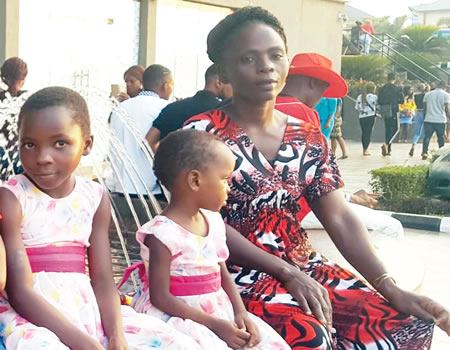BURUTU
On January 29, 2019, 42-year-old Mrs Maria Lawrence and her two beautiful daughters, Dorcas, 6 years old, and Clara, 4 years old, left Warri for Burutu via water transport, bidding farewell to family and friends who had accompanied them to one of the jetties that litter Warri in Delta State.
Like Kurutie and Okerenkoko, Burutu is another island settlement that is cut-off from mainland Warri in Delta State and is only accessible through the use of water transportation.
If Mrs Maria Lawrence had known that the boat ride from Warri to Burutu of that day would be fatal, maybe she would have decided to spend the night in Warri and postpone doomsday, or at least insist on life jackets for her and her children.
For Mrs Maria Lawrence, her two daughters and about 15 other passengers on board the ill-fated boat ride from Warri to Burutu on that fateful night, disaster struck and claimed the lives of about five people when the boat, due to poor visibility, collided with an oil bunker not too far from Burutu. None of the passengers had life jackets on. Maria Lawrence, her two daughters, alongside two other passengers drowned that fateful night.
In the words of Kio Smith Solomon, the younger brother to late Maria Lawrence, “If only the boat had left during the day; if only it was not a night trip; if only they had life jackets on, my sister and her two daughters would still be alive today.
“The boat left late in the night and rammed into an oncoming oil bunker, leaving the boat sinking. Before rescue could arrive, my sister and her two daughters, and two other persons had already drowned. It’s such a waste of lives,”
PORT HARCOURT
Like in Warri, Delta State where boat transportation thrives without the use of life jackets, investigations also revealed that many Niger Delta cities and towns also throw caution to the wind when connecting towns via water transportation.
When Nigerian Tribune visited towns like Abonema and Okrika from Port Harcourt, the safety compliance of many boat operators and users was just slightly fair compared to what obtains in Warri. Only two out of every 10 boats that leave Port Harcourt to Abonema or Okrika ensure passengers wear life jackets onboard. On the issue of night boat rides, compliance level in Abonema and Okrika creeks remain very low as speed boats criss-cross the waters even at night.
NDOLI
Further findings also revealed that boat rides between towns in the Niger Delta thrive on very low safety level. Connecting Ndoli, a riverine community in Rivers State from Aboh in Delta State takes the grace of God due to the prevalence of night boat rides and insufficient life jackets for water transportation passengers in the region.
Ndoli in Rivers State and Aboh in Delta State are divided by an expanse of inland waterways. Like many towns and cities in the Niger Delta, accessibility is only through the water.
Speaking to the Nigerian Tribune, Theophilus Alumona, a teacher from Aboh lamented that government through the National Inland Waterways Authority (NIWA) needs to focus more attention on water transportation in the Niger Delta region.
In the words of Alumona, “More attention has been shifted to Lagos maybe because many of the maritime agencies have their head offices in Lagos, and maybe due to the huge revenue that accrues into government coffers from the Lagos end of the ports.
“Over here in the Niger Delta region, many deaths occur daily on the inland waterways unreported. Many people are losing loved ones due to very low safety compliance level in this part of the world. Aside the fact that there is insufficient amount of life jackets, many operators do night trips not because they want to, but because passengers besiege the jetties for boat rides at night.
“For communities like Ndoli in Rivers State and Aboh in Delta State where oil companies have activities, movement of people who depend on cluster jobs created through the activities of giant oil companies in both communities have increased over the years.
“The activities of these oil companies have created means of livelihood for many residents of these communities. Many go in search of their means of survival navigating the waterways without safety concerns. It’s true accidents occur on these waterways, but many remain unreported to this day.”
LAGOS
While the enforcement level in Lagos can still be rated above average, some dare-devil boat operators still strive to beat the system by embarking on dangerous boat rides with passengers not putting on safety apparatus. In the words of the Lagos General Manager, NIWA, Mr Muazu Sambo, “We just recently nabbed a boat operator, Mr Balogun Oriyomi, for ferrying 15 school children from Takwa Bay to Osborne for school events on one of the busiest routes in Lagos without any of them having life jackets on. In short, there was no life jacket onboard the boat when we stopped it on the Lagos lagoon.
“NIWA won’t allow a repeat of deadly rides on the Lagos lagoon were the lives of passengers are put at risk. That wont happen again in Lagos.”
NIWA
When contacted, the National Spokesman of NIWA, Mr Tayo Fadile acknowledge that it is practically impossible to provide life jackets to everyone using Nigeria’s inland waterways. In his words, “It’s almost impossible to provide life jackets to everyone using more than 10,000 navigable waterways in Nigeria. Ideally, every boat operator is expected to provide life jackets for their passengers, not necessarily NIWA. However, we are to enforce compliance to the laws which hopefully will soon be gazetted by the Federal Ministry of Justice.
“Ensuring wearing of life jackets across the country is work in progress. We will get there soon. To monitor thousands of water jetties and water crafts on 10,000 navigable waterways is a big task that must be done sooner than later.”






